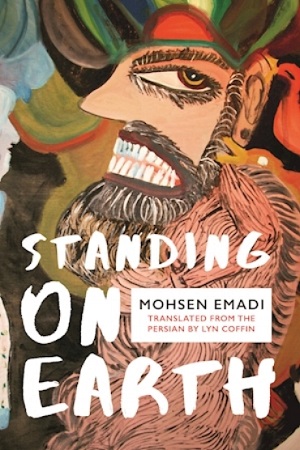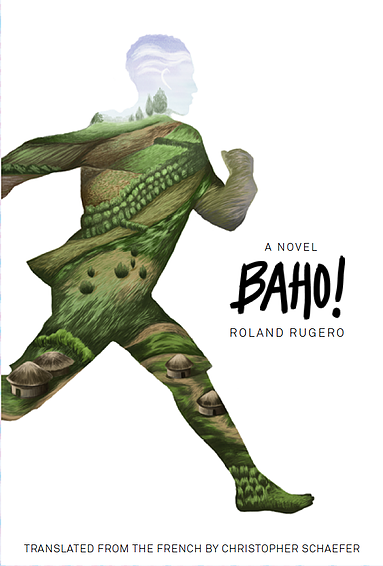 Standing on Earth, by Mohsen Emadi
Standing on Earth, by Mohsen Emadi
Translated by Lyn Coffin
What does it mean to be “grounded”? Some of us take it as a powerful compliment, a suggestion that we or our works of art possess some kind of immersive quality that is more objective concerning physical reality. Some of us take it as an imprisoning insult, a thing that wraps python-thick chains around the creativity of the soul and binds it to the immobility of a single form. In both perspectives, there is an assumption of choice, an agency that is taken for granted and given credit and blame, and there is an inherent binaric other, either a flighty lack of seriousness or a drowning unimaginativeness. Those binary qualities are no coincidences – they are born in cultures that define themselves in opposition, that treat fluid identities as unquantifiable at best and threateningly alien at worst. What does “grounded” mean to an immigrant? To a refugee? To an exile? To someone who can see the myriad differences and the far from coincidental similarities between two patches of earth?
I was at Universal Studios, sitting at a table in a food court, waiting for the Waterworld show to begin. I was bored and hot, but not enough that I was going to spend four dollars on a bottle of water. I reached into my bag to pull out my phone and check my lack of messages for the third time, when I grabbed something I hadn’t expected. A small poetry collection translated by Lyn Coffin. Mohsen Emadi’s Standing on Earth, as it so happens, but I’m sure you knew that by now. Being the good little Western half-breed that I am, I had no idea who Mohsen Emadi was. I opened to the first page.
I was there.
An unborn child
playful among guns.
The sun rises
and I carry your death,
womb by womb.
That is how the book starts. There is enough in those six lines that I could spend the rest of the review unpacking them and still have enough for an essay afterward. But in the interest of keeping this readable, I will instead pose another question: are those six lines grounded? If you will excuse my forwardness, the answers are yes, and no, if we are using the binaries. We have a speaker, recalling a life before a life, living amongst weapons, bathing in the sun’s radiance, and heralding the night we all fear. These are six lines that play with time and space and identity and yet somehow are fundamentally relatable, to a genuinely horrifying degree.
There is no better flavor sampler for Standing on Earth. We are treated to beauty and terror, the inversion of assumed stability, and a questioning of that which we hold in the depths of our hearts as inviolate and fundamental. As you move from poem to poem, there is a sensation that Emadi has been forced (which is not to say he is unwilling) to witness a multiverse of realities and that this collection is something akin to an attempt to layer them over one another. It begs questions that can only germinate in minds aware that existence stretches beyond the sensible.
Structurally, the poems are rarely given standalone titles, as if actively resisting definition, and there is a sense of almost constant motion from poem to poem. I say “almost” because there are a few titles and few definite changes in style that arrive rather suddenly, as if the speaker(s) did not expect them and are trying on new identities. While much of the poem has a fairly simple layout in terms of alignment and spacing, there is a moment of fascinating derivation. The poem “my skull…” indents on a whim and repeatedly, and it is the only work in the collection to do so. It felt like a twitch, like a spasm, as if even a basic and otherwise conformity becomes unpalatable. It is a powerful reminder of everything going on beneath the surface, of the pressure building below even the already evident venting within the language.
My skull’s
a cup of wine
and a Chinese painter
painted
on the edge
a herd
of
horses
racing
inebriated.
Given the sheer scale of perspectives that Emadi is trying to amalgamate, it is little surprise that the topics covered are multitudinous as well. Everything from general relativity to colonialism to narcotics to grammar is covered with at least the kind of gaze you reserve for the person who has caught your eye through the bus window and made you to wonder at the depth of their life. But some topics, noticeably time, space, and love, repeatedly return to center stage, not so much out of a direct effort to focalize them, but rather in the vein of a nervous tick – incessant internal questioning from the minds of the speaker(s), a heady cocktail of self-doubt and adrenaline that compels flight and fight. They are covered beautifully and nervously and passionately, spared no distraction in their not always pleasant detail.
As something of a side note, I do not speak Persian by any stretch, so I can’t comment on the accuracy of Lyn Coffin’s translations, but I am still incredibly impressed by them. To translate any work is to rewrite it, not only in the direct terms of language to language but in the sense of finding a common ground between two thought-processes that can capture the essence of the original. To put it simply, Lyn Coffin’s words are beautiful and brimming with potency, because Mohsen Emadi’s words are beautiful and brimming with potency. While I have no doubt that actually knowing Persian and reading the original poems would enhance the experience that is Standing on Earth, I have no small admiration and appreciation for this version.
My favorite line in the whole collection is “Meaning is utopian.” Not only does it capture the entirety of the collection in the way the first six lines do, but the multi-faceted power on display in three words is the kind of genius that most of us can only aspire to. Utopia, or perfection, is a goal that must always be pursued but never attained. It can’t actually be attained, because perfection is impossible, but even if it were, it would represent true and total stagnation, an end of all possibility and potential. And yet we must seek it out, because the search for it is the effort to better ourselves, to build upon what has come before and allow our descendants to do the same. Meaning is the same; it is impossible to achieve by its very definition, and yet the search for it encapsulates the whole of the human experience. That struggle reveals everything about us. In an age where we are coerced into thinking all else as “other”, an age where the defining battles are between “us” and “them”, an age where we all think ourselves as living in Winthrop’s city on a hill, we need more books like Standing on Earth. We need more reminders that we are all standing here, grounded, on our little patch of earth.
Standing on Earth is available now through Phoneme Media.

 Smooth-Talking Dog by Roberto Castillo Udiarte
Smooth-Talking Dog by Roberto Castillo Udiarte